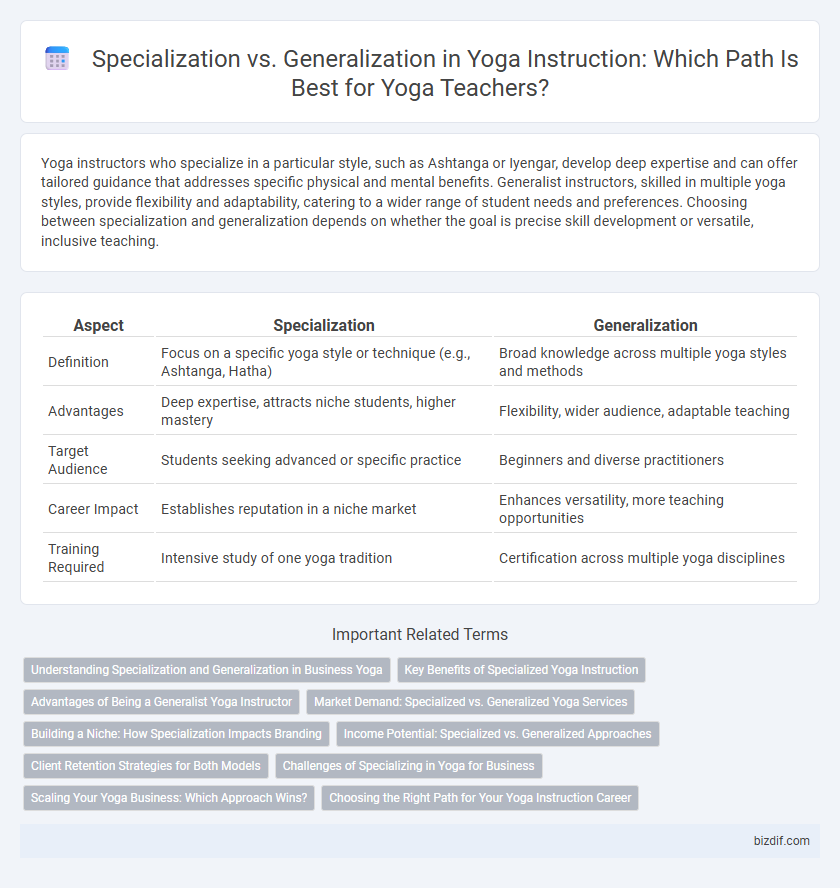Yoga instructors who specialize in a particular style, such as Ashtanga or Iyengar, develop deep expertise and can offer tailored guidance that addresses specific physical and mental benefits. Generalist instructors, skilled in multiple yoga styles, provide flexibility and adaptability, catering to a wider range of student needs and preferences. Choosing between specialization and generalization depends on whether the goal is precise skill development or versatile, inclusive teaching.
Table of Comparison
| Aspect | Specialization | Generalization |
|---|---|---|
| Definition | Focus on a specific yoga style or technique (e.g., Ashtanga, Hatha) | Broad knowledge across multiple yoga styles and methods |
| Advantages | Deep expertise, attracts niche students, higher mastery | Flexibility, wider audience, adaptable teaching |
| Target Audience | Students seeking advanced or specific practice | Beginners and diverse practitioners |
| Career Impact | Establishes reputation in a niche market | Enhances versatility, more teaching opportunities |
| Training Required | Intensive study of one yoga tradition | Certification across multiple yoga disciplines |
Understanding Specialization and Generalization in Business Yoga
Understanding specialization in business yoga involves focusing on targeted practices that address specific client needs such as stress relief, athletic performance, or rehabilitation. Generalization emphasizes offering a broad range of yoga styles and techniques to appeal to a wider audience, enhancing inclusivity and adaptability. Balancing specialization and generalization helps instructors tailor their services effectively while maintaining market versatility and client retention.
Key Benefits of Specialized Yoga Instruction
Specialized yoga instruction offers targeted benefits by addressing specific physical conditions, such as back pain or arthritis, thereby enhancing therapeutic outcomes. Instructors with expertise in specialized styles like prenatal Yoga or Iyengar Yoga provide customized techniques that improve alignment, flexibility, and injury prevention. This targeted approach accelerates progress, ensuring practitioners receive maximum benefits aligned with their unique health needs and goals.
Advantages of Being a Generalist Yoga Instructor
A generalist yoga instructor offers diverse expertise in multiple yoga styles, attracting a wider range of students and adapting to varied client needs. This versatility enhances class engagement and retention by providing customized sessions that address different fitness levels and goals. Broad knowledge also fosters continuous learning and professional growth, making the instructor more resilient to market changes.
Market Demand: Specialized vs. Generalized Yoga Services
Specialized yoga services such as prenatal, therapeutic, or power yoga cater to specific market demands seeking targeted health benefits and expertise. Generalized yoga instruction appeals to a broader audience, offering versatility and accessibility for beginners and diverse practitioners. Market trends indicate higher client retention and premium pricing in specialized yoga niches due to their tailored approach and perceived value.
Building a Niche: How Specialization Impacts Branding
Focusing on a specialized yoga niche enhances brand recognition by targeting specific student needs and differentiating from general yoga instruction. Specialized programs, such as prenatal yoga or yoga therapy for athletes, attract dedicated communities seeking tailored guidance, increasing client loyalty and referrals. Clear specialization strengthens marketing efforts, enabling instructors to craft precise messaging that resonates with their ideal audience.
Income Potential: Specialized vs. Generalized Approaches
Specialized yoga instructors who focus on niche areas such as prenatal, therapeutic, or advanced asanas often command higher fees and attract dedicated client bases, enhancing income potential. Generalized yoga teachers offering broad styles like Hatha or Vinyasa may enjoy steady class attendance but can face greater competition and lower pricing flexibility. Income growth in yoga instruction frequently correlates with defining a clear specialization that meets specific market demands and allows premium service offerings.
Client Retention Strategies for Both Models
Yoga instructors specializing in niche areas such as prenatal or restorative yoga can enhance client retention by offering tailored programs that address specific needs, increasing perceived value and loyalty. Generalist yoga instructors maintain higher retention rates by providing diverse class options suitable for a wider audience, fostering consistent engagement through variety and adaptability. Both models benefit from personalized communication, regular progress tracking, and community-building efforts to strengthen long-term client relationships.
Challenges of Specializing in Yoga for Business
Specializing in yoga business narrows target markets but intensifies competition within niche segments, requiring deep expertise and tailored marketing strategies. Limited audience reach can restrict revenue streams and make client acquisition more challenging compared to general yoga instruction. Niche specialization demands continuous education and adaptation to evolving trends, which can increase operational costs and risk business stagnation.
Scaling Your Yoga Business: Which Approach Wins?
Specializing in a niche such as prenatal yoga or yoga for athletes allows instructors to attract a targeted client base, enhancing brand authority and maximizing revenue per client. Generalizing across multiple styles broadens market appeal and fills more classes but may dilute brand identity and limit premium pricing opportunities. Scaling a yoga business depends on balancing focused specialization for loyal, high-value clients with generalization strategies that sustain consistent class enrollment.
Choosing the Right Path for Your Yoga Instruction Career
Specializing in a specific yoga style such as Ashtanga or Yin builds deep expertise and attracts niche students seeking targeted practice, while generalizing offers versatility to teach diverse classes and adapt to broader client needs. Evaluating market demand, personal passion, and certification opportunities helps determine the optimal path for sustainable career growth in yoga instruction. Balancing specialization with general skills enhances instructor credibility and expands professional prospects in the competitive wellness industry.
Specialization vs Generalization Infographic

 bizdif.com
bizdif.com